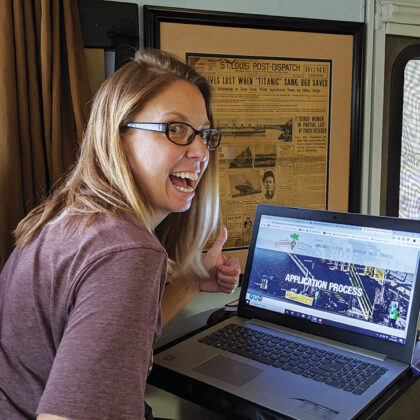Our first year out Workamping, we talked to a co-worker in the Grand Tetons in Wyoming. Bruce was back for his third season. He had spent the previous winter in Big Bend National Park in Texas working for the concessionaire. Though he worked full-time and only paid about $25/month for his RV site, his comment was, “I shouldn’t have gone. I lost money.” How is this possible?

by Jaimie Hall Bruzenak
This article comes from an issue of Workamper News magazine. COPYRIGHT by Workamper News. IT IS A VIOLATION OF U.S. COPYRIGHT LAW TO PUBLISH, POST, BROADCAST OR PHOTOCOPY ANY PORTION OF THIS PUBLICATION.
Several years later, Bill and I worked in Skagway, Alaska for two summers earning $2-3 more per hour than usual, but we walked away with less money. How could that happen?
When evaluating a job and figuring what you’ll earn, you need to consider more than the hourly wage. There are some costs associated with working. If you are comparing two jobs, the one with the highest wage may not make the most money.
Doing research and a few computations can help you determine ahead of time whether on this job you will spend more than your income, break even or add to your savings.
What do you usually spend?
You should already know what you spend and what you need to earn before you start job hunting. Using either actual expenditures or a realistic budget, take the total of what you usually spend, subtract your regular income (if any) and the difference is what you will need to earn over the course of a year. If the money you make at a particular job doesn’t add up to what you need, that money will have to come from other income or savings or you’ll need to work more or earn higher wages.
Extra job and living expenses
Fuel: Besides your normal expenses, it costs to travel to a job. A long drive to a job could cost much more than you usually spend in fuel. Compute approximate fuel costs by figuring the number of miles to your destination using a map program, divide it by your average miles per gallon (mpg) to compute how many gallons the trip will take. Multiply that by the price of fuel per gallon for your total.
Is the cost higher than what you’ve allotted for travel expenses for that time period? To be realistic, you should figure maintenance and depreciation as well as fuel costs plus a little extra in case your mpg goes down due to wind.
Food: The cost of living and fuel to the grocery store could raise spending here. To shop at a supermarket, Workampers in remote areas may have to drive more than 100 miles. Figure that food in a resort area or small town will also cost more. You can get rough figures on cost of living by putting in a nearby medium-sized town in this calculator. Or, use the Internet to find grocery ads for the location.
RV Site: If you are working outside an RV park and have to find a place to stay, what will you have to pay? Is it more than you have budgeted for? If you are receiving a site as part of your compensation, I recommend figuring what you are really “paying for it,” but here we are looking at out-of-pocket expenditures. Check with the Employer to make sure the value of your site will not be counted as barter income.
Utilities: Propane usage could be more than usual if temperatures get cold. In some positions, the Workamper pays for electric, a killer if it gets very hot. Weather Underground can give you historic temperatures for an area.
Clothing: Will you have additional expense purchasing uniforms, special clothing or paying for cleaning?
Entertainment and recreation: In many places, your recreation and entertainment costs will go down. On the other hand, you could be tempted to take expensive excursions or eat out more, raising your spending.
Adding these extra costs, even if only a guestimate, to your regular expenses will give a figure approximating what it will cost to take this job. Compare that to the wages you will earn, less any charges for your RV site and for income taxes. Which is higher? Costs or earnings?
Money may not be the only factor. You might really want to be in a certain location even if it costs extra to do so; the experience is worth it. That was the case when I wanted to work in Alaska. Though we didn’t clear as much money, Alaska was an important dream of mine so we went anyway. In Bruce’s case, he decided to look elsewhere for work the following winter.
The bottom line? Do the math, then take both money and what is important into consideration to make the best decision for you for this season.
Thanks for reading the Gone Workamping blog from Workamper News. Join Workamper.com today to see all the new job opportunities for RVers, as well as the training and resources to confidently find the right Workamping job for you – easily and securely.






